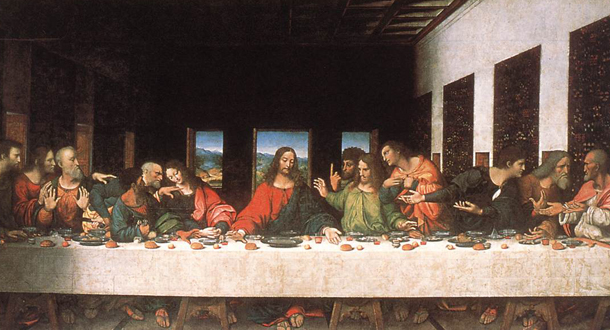Evening Mass of the Lord’s Supper
Scripture:
Exodus 12:1-8, 11-14
1 Corinthians 11:23-26
John 13:1-15
Reflection:
Today the church begins the solemn triduum, the three days that celebrate the very heart of our Christian faith—the death and resurrection of Jesus Christ. Holy Thursday, of course, remembers with gratitude the Last Supper of Jesus with his apostles on the eve of his death.
The second reading for today from Paul’s Letter to the Corinthians recalls that very moment as a sacred tradition handed on to him. He, in turn, brings it to the Christian community in Corinth. The circumstances prompting Paul to recall this tradition are unusual. Apparently when the Corinthian Christians gathered for a celebratory meal on the occasion of the Lord’s Supper or Eucharist, the wealthy members of the community brought sumptuous food and wine, while the poorer members had little or nothing to eat.
Paul is shocked at this and challenges his beloved, but cantankerous, community at Corinth. The Lord’s Supper was meant to be a sacrament of unity, but some in the community used the occasion to accentuate differences and to embarrass the poor. It is this circumstance that prompts Paul to evoke the tradition of the first Eucharist—a sacred meal in which Jesus revealed to his disciples the ultimate meaning of his impending death—like bread broken, his body would be broken for them; like wine poured out, his blood would be shed for them. This act of love should be the spirit and meaning of every celebration of the Eucharist.
It is a bit of paradox that on Holy Thursday when we celebrate the Lord’s Supper, the gospel reading is not an account of that Passover meal Jesus celebrated with his disciples, but the dramatic moment in John’s Gospel where Jesus washes the feet of his disciples. This action takes place on the eve of Passover and as the disciples gather for its celebration. But in John’s Gospel, Jesus’ words over the bread and wine are evoked earlier in his Gospel, during the Bread of Life discourse in chapter 6.
Here in this gospel passage, in John’s often creative way, instead of an account of the words of institution we have a dramatic gesture that reveals what the Eucharist is meant to signify. Jesus, their Lord and Master, takes the role of a servant and washes the feet of his disciples—a startling act of humility and self-effacing service—for Jesus, an act of love.
Placed here in John’s Gospel as Jesus begins his farewell to his disciples with his death approaching, the foot washing symbolizes the heart of what it means to be a follower of Jesus—willing to put aside our hesitations and generously serve others out of love.
I have not served as a parish priest but only occasionally helped out on weekends and during Holy Week. A few times I had the occasion to wash the feet of the people designated to take part in the Holy Thursday ceremony (probably the cleanest feet in the church!). On many other occasions I have participated in the foot washing and waited with my shoe and sock off for the moment when the celebrant would wash my feet. Either way, the moment is both slightly embarrassing and deeply moving—its profound symbolism is hard to miss.
Jesus’ words in John’s Gospel reach us across the centuries: “If I…the master and teacher, have washed your feet, you ought to wash one another’s feet. I have given you a model to follow, so that as I have done for you, you should also do.”
Fr. Donald Senior, C.P. is President Emeritus and Professor of New Testament at Catholic Theological Union. He lives at the Passionist residence in the Hyde Park neighborhood of Chicago.

